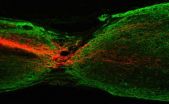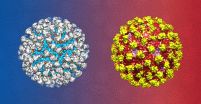One hundred and thirty six patients aged 12 and over received monthly doses of either the therapy or the placebo for one year.
The clinical trial reached its primary endpoint with patients who received therapy having a significant, if modest benefit in lung function compared with those receiving a placebo.
Patients from across England and Scotland participated, and were treated in two centres, Royal Brompton Hospital in London and the Western General Hospital in Edinburgh.
The trial is the first to show that repeated doses of gene therapy can have a meaningful effect on the disease, and change the lung function of patients. However, the team say more research is needed to improve the effectiveness before the therapy will be suitable for clinical use.
The study was carried out by the UK Cystic Fibrosis Gene Therapy Consortium, a group of scientists and clinical teams from Imperial College London, the Universities of Oxford and Edinburgh, Royal Brompton & Harefield NHS Foundation Trust and NHS Lothian who came together in 2001 to develop a gene therapy, supported by the Cystic Fibrosis Trust.
The current trial was launched in 2012 and funded by a partnership between the Medical Research Council (MRC) and the National Institute for Health Research (NIHR). The findings are published today in The Lancet Respiratory Medicine.
Cystic fibrosis (CF) is the commonest lethal inherited disease in the UK, affecting around 10,000 people nationally and over 90,000 worldwide. Patients' lungs become filled with thick sticky mucus and they are vulnerable to recurrent chest infections, which eventually destroy the lungs.
The cause of CF, mutations in a gene located on chromosome 7, was identified in 1989, opening the door to introducing a normal copy of this gene using gene therapy. In the trial, patients were treated by inhaling molecules of DNA wrapped in fat globules (liposomes) that deliver the gene into the cells in the lung lining.
Professor Eric Alton, the coordinator of the Consortium from Imperial College London, who is also a consultant physician at Royal Brompton Hospital, said: "Patients who received the gene therapy showed a significant, if modest, benefit in tests of lung function compared with the placebo group; there were no safety concerns. Whilst the effect was inconsistent, with some patients responding better than others, the results are encouraging, laying the groundwork for further trials which we hope could improve the effect.
"We are looking to undertake follow-up studies assessing higher, more frequent doses as well as combinations with other treatments. The programme of work came about through the generosity of the CF community via the CF Trust, whilst the trial exemplifies how effectively the MRC and NIHR, working in partnership, are able to move laboratory science into patient benefit. Publication of this trial is a landmark for CF patients and we are particularly grateful to the many patients across the UK who gave their time and effort to participate and make this collaborative venture a success."
Minister for Life Sciences, George Freeman said: "Cystic Fibrosis can have a devastating effect on patients and families and this is an excellent development for people living with the condition. The government is absolutely committed to supporting new medical treatments and invests £1bn a year in health research. It is vital we are at the forefront of turning scientific discoveries into tangible benefits and affordable treatments for NHS patients."
Imperial Innovations, Imperial's technology commercialisation company, is acting as the lead technology transfer office for the consortium. Innovations holds a family of patents and orphan drug designation for the treatment, and is seeking commercial partners who can support its further clinical development.
The consortium is developing a second therapy that uses a virus to deliver the DNA into cells. They are aiming to begin the first clinical trial of this treatment in 2016.
"Our aim is to achieve a step change in the treatment of CF that focuses on the basic defect rather than just addressing the symptoms. It has taken more than 20 years to get where we are now, and there is still some way to go. Eventually we hope gene therapy will push CF patients towards a normal life expectancy and improve their quality of life significantly," said Professor Alton.
Ed Owen, Chief Executive of the Cystic Fibrosis Trust, said: "We are committed to improving and transforming the lives of people with cystic fibrosis, and the results of this pioneering clinical trial are a promising development. Further clinical research is now needed before we can say that it is a viable clinical therapy but it is encouraging that a proof of concept has been established.
"The Gene Therapy Consortium (GTC) has been supported by the cystic fibrosis community for many years and the Cystic Fibrosis Trust is proud to have funded the initial programmes that led to this trial. We have also committed a further £500,000 over the next two years to support the infrastructure of the consortium and to allow further development of its longer-term work to develop a viral vector gene therapy.
"This is an extraordinary time for therapeutic development in cystic fibrosis and the need is urgent to stop so many young lives being cut short because of this cruel condition. We will therefore continue to invest in innovative genetic research and to work with academic and industry partners to develop advancements which will make further progress towards our goal of a life unlimited by cystic fibrosis."
INFORMATION:
For media enquiries please contact:
Sam Wong
Research Media Officer
Imperial College London
Email: sam.wong@imperial.ac.uk
Tel: +44(0)20 7594 2198
Out of hours duty press officer: +44(0)7803 886 248
For enquiries about the trial funding, please contact:
Alistair Thompson
Communications Manager
NIHR Evaluation, Trials and Studies Coordinating Centre (NETSCC)
Tel: 02380 597519
Email: alistair.thompson@nihr.ac.uk
For commercial enquiries please contact:
Tony Hickson
Managing Director Technology Transfer
Imperial Innovations
Email: t.hickson@imperial.ac.uk
Phone: +44 20 3053 8858
Notes to editors:
1. Journal reference: E.W.F.W. Alton et al. 'A randomised, double-blind, placebo-controlled trial of repeated nebulisation of non-viral CFTR gene therapy in patients with cystic fibrosis.' The Lancet Respiratory Medicine, 3 July 2015.
2. About Imperial College London
Imperial College London is one of the world's leading universities. The College's 14,000 students and 7,500 staff are expanding the frontiers of knowledge in science, medicine, engineering and business, and translating their discoveries into benefits for society.
Founded in 1907, Imperial builds on a distinguished past - having pioneered penicillin, holography and fibre optics - to shape the future. Imperial researchers work across disciplines to improve global health, tackle climate change, develop sustainable energy technology and address security challenges. This blend of academic excellence and its real-world application feeds into Imperial's exceptional learning environment, where students participate in research to push the limits of their degrees.
Imperial nurtures a dynamic enterprise culture, where collaborations with industrial, healthcare and international partners are the norm. In 2007, Imperial College London and Imperial College Healthcare NHS Trust formed the UK's first Academic Health Science Centre. This unique partnership aims to improve the quality of life of patients and populations by taking new discoveries and translating them into new therapies as quickly as possible.
Imperial has nine London campuses, including Imperial West: a new 25 acre research and innovation centre in White City, west London. At Imperial West, researchers, businesses and higher education partners will co-locate to create value from ideas on a global scale.
http://www.imperial.ac.uk
3. About the National Institute for Health Research
The National Institute for Health Research (NIHR) is funded by the Department of Health to improve the health and wealth of the nation through research. Since its establishment in April 2006, the NIHR has transformed research in the NHS. It has increased the volume of applied health research for the benefit of patients and the public, driven faster translation of basic science discoveries into tangible benefits for patients and the economy, and developed and supported the people who conduct and contribute to applied health research. The NIHR plays a key role in the Government's strategy for economic growth, attracting investment by the life-sciences industries through its world-class infrastructure for health research. Together, the NIHR people, programmes, centres of excellence and systems represent the most integrated health research system in the world. For further information, visit the NIHR website (http://www.nihr.ac.uk).
4. About the Medical Research Council
The Medical Research Council has been at the forefront of scientific discovery to improve human health. Founded in 1913 to tackle tuberculosis, the MRC now invests taxpayers' money in some of the best medical research in the world across every area of health. Thirty MRC-funded researchers have won Nobel prizes in a wide range of disciplines, and MRC scientists have been behind such diverse discoveries as vitamins, the structure of DNA and the link between smoking and cancer, as well as achievements such as pioneering the use of randomised controlled trials, the invention of MRI scanning, and the development of a group of antibodies used in the making of some of the most successful drugs ever developed. Today, MRC-funded scientists tackle some of the greatest health problems facing humanity in the 21st century, from the rising tide of chronic diseases associated with ageing to the threats posed by rapidly mutating micro-organisms. http://www.mrc.ac.uk
5. About the University of Oxford
Oxford University's Medical Sciences Division is one of the largest biomedical research centres in Europe, with over 2,500 people involved in research and more than 2,800 students. The University is rated the best in the world for medicine, and is home to the UK's top-ranked medical school.
From the genetic and molecular basis of disease to the latest advances in neuroscience, Oxford is at the forefront of medical research. It has one of the largest clinical trial portfolios in the UK and great expertise in taking discoveries from the lab into the clinic. Partnerships with the local NHS Trusts enable patients to benefit from close links between medical research and healthcare delivery.
A great strength of Oxford medicine is its long-standing network of clinical research units in Asia and Africa, enabling world-leading research on the most pressing global health challenges such as malaria, TB, HIV/AIDS and flu. Oxford is also renowned for its large-scale studies which examine the role of factors such as smoking, alcohol and diet on cancer, heart disease and other conditions.
6. About Royal Brompton & Harefield NHS Foundation Trust
Royal Brompton & Harefield NHS Foundation Trust is the largest specialist heart and lung centre in the UK and among the biggest in Europe. The Trust works from two sites, Royal Brompton Hospital in Chelsea and Harefield Hospital near Uxbridge, West London. The UK's first adult CF service was established at Royal Brompton Hospital in 1965 by Sir John Batten, in response to the increasing number of patients living with the condition into adulthood. Royal Brompton's current cystic fibrosis (CF) centre is one of the largest in Europe, caring for nearly 700 adults and 350 children.
7. About the Cystic Fibrosis Trust
The Cystic Fibrosis Trust is the only UK-wide charity making a daily difference to the lives of people with cystic fibrosis, and those who care for them.
Find out more about the Cystic fibrosis Trust: cysticfibrosis.org.uk or call our helpline 0300 373 1000.



